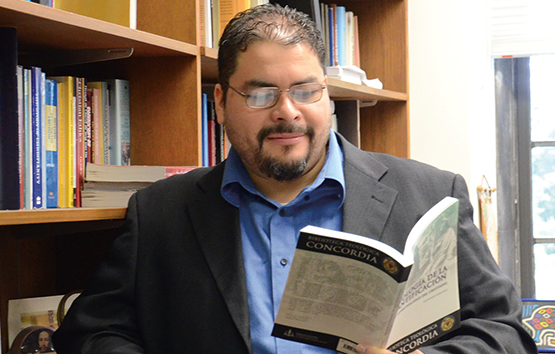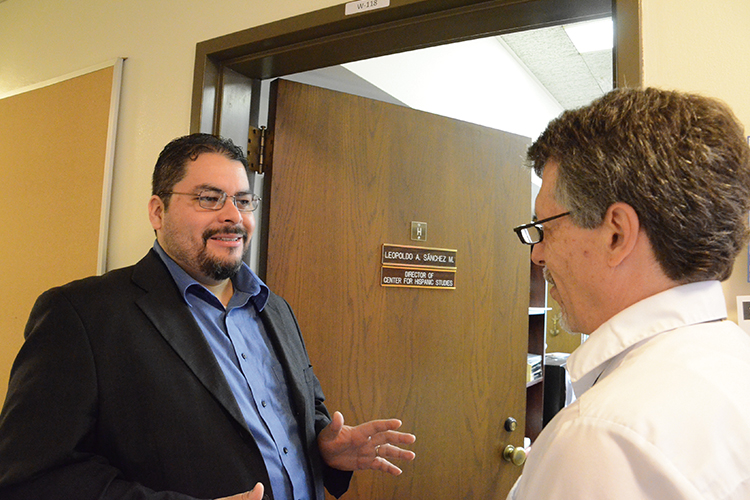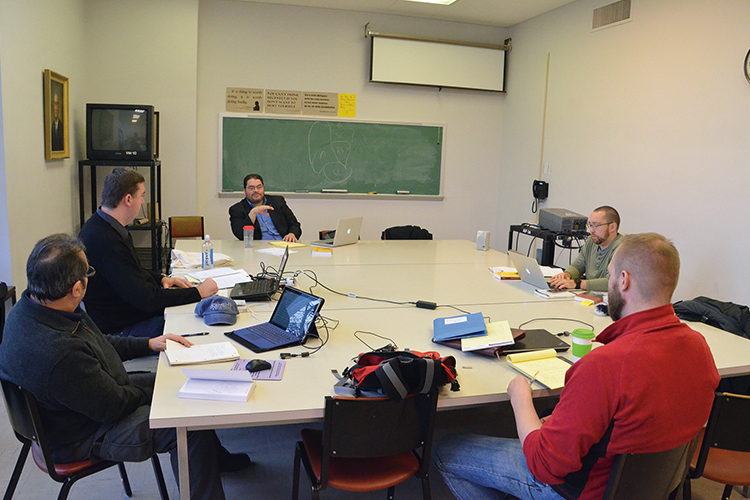
Concordia Seminary Newsroom
A professor’s theological and geographical journey

By Travis Scholl
How does a boy who was born in Chile and grew up in Panama, end up in Iowa? Professor Leopoldo A. Sánchez M. says it’s all the work of the Holy Spirit. “The Holy Spirit does things like that,” Sánchez says, “brings things together.” As it turns out, the work of the Spirit has absorbed Sánchez’s own journey from doctoral student to Concordia Seminary professor and in writing recent books on the subject.
The journey has been both theological and geographical. Sánchez’s mother is from Chile, his father from Panama. After a military coup in Panama, his father went to Chile to study in the 1970s, met and married Sánchez’s mother, and eventually returned to Panama with baby Leopoldo too. His parents were culturally Catholic but essentially unchurched. During his teenage years, friendships with Catholics and Pentecostals — the largest number of Christians in Latin America — introduced him to the faith.
Sánchez came to the United States via a high school exchange program and ended up in Williamsburg, Iowa, a farming community along Interstate 80, with a population of 3,000 people. There, he lived with Larry and Pat Dellamuth
and their three children, Mike, Dave and Michelle. The Dellamuths told the young Leo that they would take him to church wherever he felt comfortable. But the warmth and hospitality of their family drew him in, and he knew he wanted to accompany them to St. Paul Lutheran Church. Two years later, he was confirmed by Pastor Phill Andreasen.
“When people in the United States ask me how a person from Panama becomes Lutheran,” Sánchez says, “I say, ‘I became a Lutheran in Iowa. Don’t mess with me!’”
His interest in ministry had its roots in Panama, but ripened while studying at Concordia University Wisconsin, Mequon. There, he met his wife, Tracy. He continued his studies at Concordia Theological Seminary in Fort Wayne, Ind., primarily because of the encouragement of Rev. Roosevelt Gray, who worked in admissions there at the time and whom Sánchez considers a spiritual father. While on vicarage in Venezuela, Sánchez began to explore in depth the question of what it means to be Lutheran and Latino. He fully intended to complete his master’s degree in theology and return to Latin America.
A chance encounter with Dr. Dan Mattson, at the time an executive with LCMS World Mission, changed all that. He encouraged Sánchez to try “something different” before returning to his homeland. He visited Concordia Seminary, St. Louis and Professor James W. Voelz, then the first dean of the Seminary’s newly minted Ph.D. program, recruited him to do doctoral work. While a graduate student here, Sánchez worked closely with Professor Doug Groll in the former Hispanic Institute of Theology, and Groll opened his eyes to the immigrant Latino experience in North America. “To be Latino in North America,” Sánchez says, “is to be on the edges and in the margins, which is exactly where the Spirit drove Jesus in His earthly ministry.” After finishing his Ph.D. in 2003, Sánchez and his family (Tracy and Leo have two children, Lucas and Ana) were deployed through the Hispanic Institute of Theology to southern California. Eventually, Sánchez became the institute’s successor, now called the Center for Hispanic Studies.
The work Sánchez has done on what he calls “Spirit Christology,” which began with his doctorate, ultimately led to his book, Receiver, Bearer, and Giver of God’s Spirit, published in 2015. Yet, his work with the Center for Hispanic Studies has led him into more complicated ethical issues like immigration. This resulted in his work on the LCMS Commission on Theology and Church Relations (CTCR) document Immigrants Among Us (2012) as well as his role as an editor of the book Immigrant Neighbors Among Us (2015).
Now Sánchez can see these two different paths of his work come together. He is finishing a year-long sabbatical funded by a grant from the prestigious Louisville Institute, during which he has been able to write his next book on models of the Christian life, to be published by InterVarsity Press in 2018. One of the models deals with the church’s life of hospitality. As Sánchez says, “The Spirit pushes Jesus — and His followers — into just those situations along the border, to those marginalized and left behind.”
He also is preparing to write a book in Spanish on Christian hope for the Biblioteca Teológica Concordia series published by Concordia Publishing House. He has already written two other volumes in the series on the Holy Spirit and sanctification.
But as Concordia Seminary prepares for its revised Master of Divinity curriculum this fall, Sánchez is most looking forward to returning to the classroom to teach systematic theology as the Werner R.H. Krause and Elizabeth Ringger Krause Professor of Hispanic Ministries. He also is looking forward to playing a continuing role in theological education and formation in other distance programs, like the Center for Hispanic Studies.
In this sense, things are coming full circle again. The center graduated its first Master of Arts (M.A.) student from Latin America (Paraguay) in the spring of 2017. Three U.S. Hispanic students also have completed the M.A. “I am excited to see what the local and global impact of Concordia Seminary and the Center for Hispanic Studies can become,” Sánchez says. No doubt, the Holy Spirit will have a role to play in that, too.
Rev. Travis Scholl is managing editor of Seminary Publications.

Professor Leopoldo A. Sánchez M., left, chats with Mark Kempff, assistant to the director of the Center for Hispanic Studies. Photo: Tiffany Leong

Professor Leopoldo A. Sánchez M. leads a class of Ph.D. students in 2016. Photo: Melanie Ave